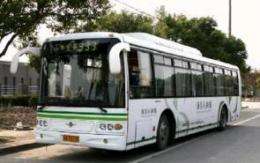October 21, 2009 weblog
Ultracapacitors Make City Buses Cheaper, Greener

(PhysOrg.com) -- A fleet of 17 buses near Shanghai has been running on ultracapacitors for the past three years, and today that technology is coming to the Washington, DC, for a one-day demonstration. Chinese company Shanghai Aowei Technology Development Company, along with its US partner Sinautec Automobile Technologies, predict that this approach will provide an inexpensive and energy efficient way to power city buses in the near future.
The biggest advantage of ultracapacitors is that they can fully recharge in less than a minute, unlike lithium-ion batteries which can take several hours. The downside of ultracapacitors is that they currently have a very short range, providing a distance of only a few miles, due to the fact that ultracapacitors can store only about 5% of the energy that lithium-ion batteries can hold.
Although their short range makes ultracapacitors impractical for cars, city buses have to stop frequently anyway. By quickly recharging at bus stops, buses could take advantage of ultracapacitors' other benefits: a bus with ultracapacitors uses 40% less electricity compared to an electric bus with lithium-ion batteries, and requires just one-tenth the energy cost of a typical diesel-fueled bus, which would save about $200,000 during the life of the vehicle. Plus, the buses are environmentally friendly: "Even if you use the dirtiest coal plant on the planet, it generates a third of the carbon dioxide of diesel when used to charge an ultracapacitor," said Dan Ye of Sinautec.
Today's demonstration will take place at American University in Washington, DC, where an 11-seat minibus powered by ultracapacitors will be shuttling people around campus. At designated charging stations, which double as bus stops, the bus recharges by raising a collector on top of the bus a few feet to touch an overhead electric charging line, which recharges ultracapacitor banks stored under the bus seats.
The two companies hope that this is just the beginning for ultracapacitor buses. The company that makes the Shanghai buses, Foton America Bus Co, based in Tennessee, plans to deliver another 60 buses to the Chinese city in early 2010. The new buses will have ultracapacitors manufactured by Shanghai Aowei that supply 10-watt hours per kilogram, compared with the current ultracapacitors that have an energy density of six watt-hours per kilogram. Other US cities, including New York City, Chicago, and some towns in Florida, have also expressed interest in trialing the buses.
The companies expect that the ultracapacitors will continue to achieve higher energy densities in the future, which would allow them to hold a charge for longer. This improvement could increase the driving range from a few miles to 20 miles or more, helping to decrease the number of charging stations required on a route and make the technology practical for many more cities and bus routes.
More information: Sinautec
via: Technology Review
© 2009 PhysOrg.com
















